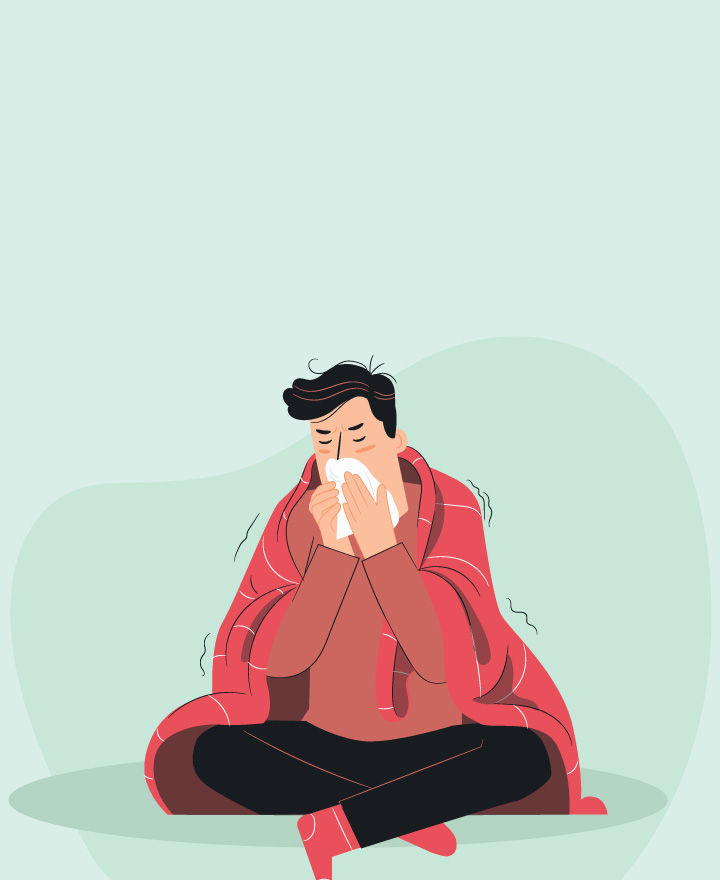

Skeeter Syndrome: Causes, Symptoms and Treatment
Skeeter syndrome is a rare allergic reaction affecting some people after a mosquito bite. While a mild skin reaction is normal after any mosquito bite, some individuals develop an intense allergic reaction known as Skeeter syndrome. Though it is not contagious or typically life-threatening, it can be particularly uncomfortable. Read on to know more about Skeeter syndrome, its possible causes, symptoms to watch out for, and treatment options available.
What Is Skeeter Syndrome?
Skeeter syndrome is a severe skin reaction characterised by swelling, redness, rashes, blistering and inflammation on the location of the bite. Individuals allergic to the protein present in a mosquito’s saliva often get infected.
Causes
For Skeeter syndrome to occur, the mosquito needs to be in contact with your skin for at least six seconds. This reaction is triggered by the body's response to polypeptides, which are a type of protein found in the saliva of female mosquitoes. These polypeptides are chains of amino acids that the immune system can sometimes overreact to, leading to severe symptoms.
While Skeeter syndrome is rare, certain groups of people are more susceptible:
• Infants and young children, as their immune systems are still developing.
• Adults bitten by a mosquito species they haven’t encountered before, since the makeup of mosquito saliva can vary between species, a person may react to one type but not another.
• Individuals with immune system disorders may have heightened or abnormal immune responses.
For such individuals, having a health insurance plan is extremely important. Health insurance can ensure that they can receive the medical treatment that they need at the right time without any hassle.
However, you should know that the more often a person is bitten by mosquitoes, the more their body tends to build up a tolerance to the proteins in the saliva. As a result, severe reactions like Skeeter syndrome become less common over time. Hence, if you receive treatment when you need it, you might build and a stronger immunity to it.
Symptoms
The various symptoms associated with Skeeter syndrome are:
• Redness: Soon after the mosquito bite, the skin turns red, sensitive and inflamed.
• Pain: Some find the bite site highly painful and tender.
• Severe itching: The affected part may become intensely itchy, causing much discomfort.
• Swelling: The affected area may swell far beyond the immediate bite site.
• Blisters: In the case of severe reactions, the individual develops large blisters on the bite site.
Apart from the symptoms listed above, some individuals with Skeeter syndrome may experience other symptoms, such as:
• Fever
• Skin warmth and discolouration
• Headache and body aches
• Swollen lymph node
• Nausea
• Confusion
• Light sensitivity
• Skin hardening
• Bruises
• Skin hardening
Diagnosis
The doctor will take your medical history first and then undertake a physical examination of the bite location. During the diagnosis, your doctor may ask you questions like:
• Were you bitten by mosquitoes?
• Did you suffer from such allergic reactions in the past?
• Did you travel to some other country where the mosquitoes have bitten you?
• When did you notice the reaction after the bite? What was the time interval?
• Are you suffering from shortness of breath?
The Skeeter syndrome diagnosis part usually does not include any blood tests.
During the physical examination, your doctor may look for signs and symptoms like redness, inflammation, warmth, swelling, lesion size, firmness of the bite area, etc.
If you are diagnosed with Skeeter syndrome, your doctor may refer you to an allergist who can offer you the appropriate treatment.
Treatment
Once diagnosed with Skeeter syndrome or mosquito bite allergy, your doctor will prepare a mosquito bite allergy treatment plan for you. The treatment offered often looks similar to the one offered for an insect bite. You may be treated with:
• Oral antihistamines to relieve swelling and itching
• Topical corticosteroids to alleviate the inflammation
• Pain killers for managing pain and fever
Apart from the other medications and treatments, you may use some effective home remedies to alleviate your symptoms. This includes:
• Apply ice packs to relieve swelling and pain.
• Take an oatmeal bath to alleviate itching.
• Wrap a cloth soaked in cold water around the affected area.
Prevention Tips
To avoid getting Skeeter syndrome, you must abide by the prevention tips listed below:
• Use a mosquito repellent cream to avoid mosquito bites.
• Wear thicker clothing that offers enough coverage to your body to stop mosquitoes from biting you.
• Use window and door screen guards and mosquito nets to keep away mosquitoes.
• Keep your drains covered, and do not allow water to collect in gutters or in potholes around your house. This can stop mosquitoes from breeding.
Conclusion
Now that you are aware of the rare Skeeter syndrome and its causes, it’s important to remember that although the condition can cause significant discomfort, life-threatening reactions are extremely rare. Most cases can be managed with over-the-counter antihistamines and topical creams. However, if you or your child develops severe swelling, difficulty breathing or other unusual symptoms after a mosquito bite, seek medical attention promptly.
Having a reliable health insurance plan can ease the financial burden of such situations, giving you access to quality treatment without added stress. Look for a policy that aligns with your specific health needs and offers comprehensive coverage for both routine care and medical emergencies.
One of the important components of our overall wellness is also being financially secured. Healthcare emergencies can happen any time, but a good health insurance policy can protect you from such uncertain situations. To know more about Wellness and other health related tips, visit the wellness corner.
Disclaimer: This blog provides general information and discussions about health and related subjects. The information and other content provided in this blog, website or any linked materials are not intended and should not be considered or used as a substitute for medical advice, diagnosis, or treatment. Kindly contact your doctor before starting a new medicine or health regime.
Related Articles
Skin Allergy: Types, Causes, Symptoms And Treatments
How Are Food Allergies Diagnosed?
How To Treat Itchy Skin At Night?
Causes of Dry Eye & How to Treat it
Published on July 14, 2025















 Health Insurance
Health Insurance  Travel Insurance
Travel Insurance  Car Insurance
Car Insurance  Cyber Insurance
Cyber Insurance  Critical Illness Insurance
Critical Illness Insurance
 Pet Insurance
Pet Insurance
 Bike/Two Wheeler Insurance
Bike/Two Wheeler Insurance  Home Insurance
Home Insurance  Third Party Vehicle Ins.
Third Party Vehicle Ins.  Tractor Insurance
Tractor Insurance  Goods Carrying Vehicle Ins.
Goods Carrying Vehicle Ins.  Passenger Carrying Vehicle Ins.
Passenger Carrying Vehicle Ins.  Compulsory Personal Accident Insurance
Compulsory Personal Accident Insurance  Travel Insurance
Travel Insurance  Rural
Rural